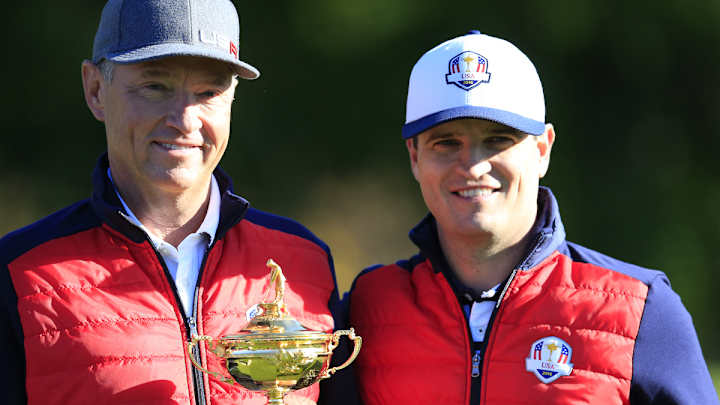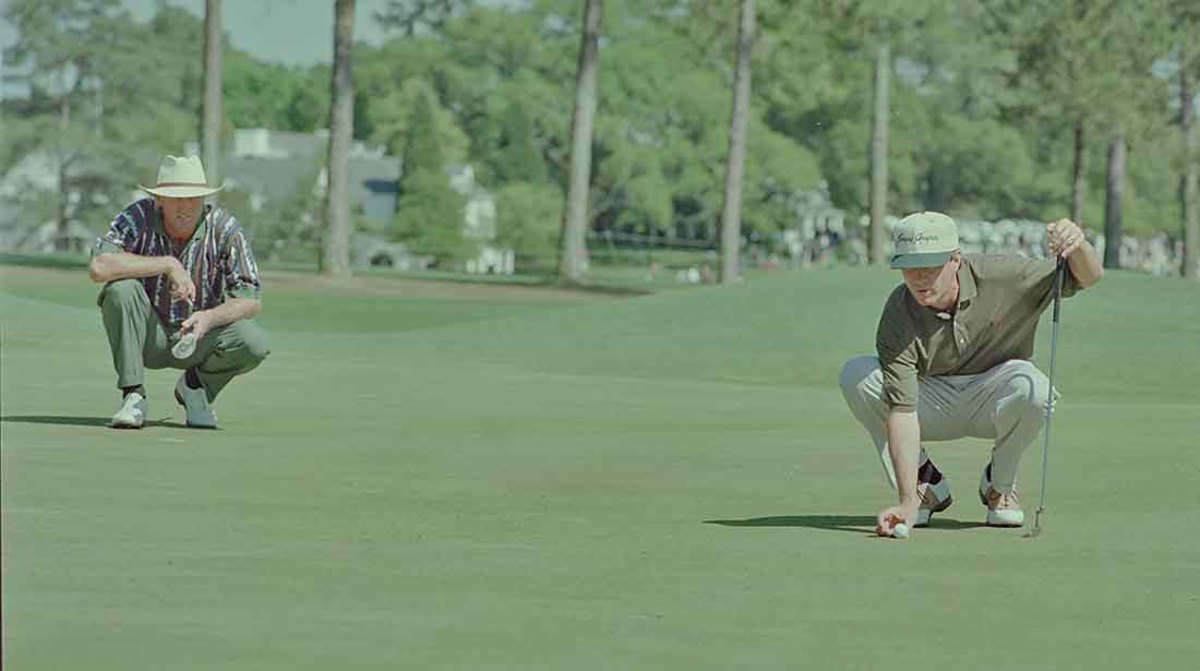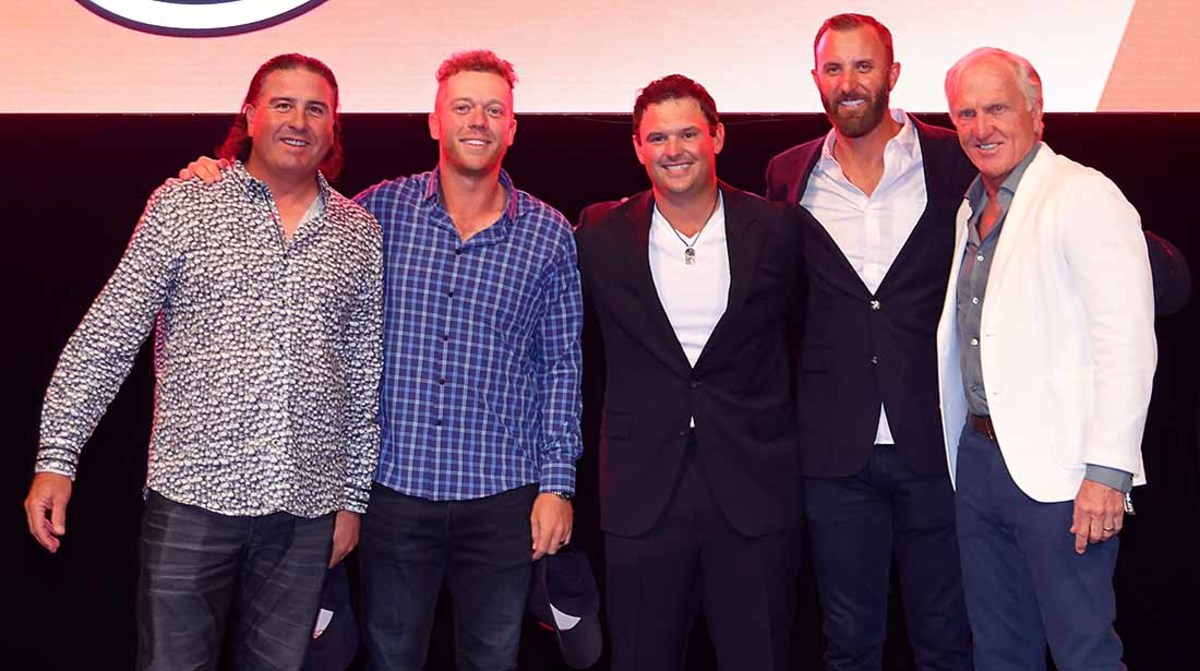‘You Can’t Convince Them’: U.S. Team Captains Fighting the Tide of PGA Tour Defectors

Way back in the days of yore—you know, two months ago—Davis Love III would warn guys who were being romanced by the Saudi Arabian government. You can leave the PGA Tour for the guaranteed riches of LIV Golf, he would tell them. But there will be ramifications.
“I was on Presidents Cup watch,” says Love, who will captain the Americans against an international squad in September. “I can't call up every Charles Howell [III] and say, ‘What are you thinking?’ It’s not my place. I was just making sure they understood that they weren’t gonna play Presidents Cup.”
Love went down the Presidents Cup points standings and talked to guys he knew were considering the leap. Dustin Johnson. Talor Gooch. Hudson Swafford. They all left anyway. Love looked at the list again. Brooks Koepka? “We kept hearing all the way through the U.S. Open. ‘Oh, he’s solid,’” Love says. “And then he wasn’t.” A week after bristling that he hadn’t given much thought to LIV, Koepka signed up. After so many players left the Tour, including many who claimed they were staying, Love finally stopped asking.
“I just threw my hands up,” Love says. “They’re getting told so many things that aren’t true. You can’t convince them otherwise.”
The most interesting team competitions in men’s golf used to be the Ryder Cup (U.S. vs. Europe) and Presidents Cup (U.S. vs. everyone except Europe.) Now it is the PGA Tour vs. LIV. The Tour, which runs the Presidents Cup, has banned LIV players from all of its events. The PGA of America and DP World Tour have said that LIV golfers are not eligible for the Ryder Cup.

It has left Love and the 2023 Ryder Cup captain Zach Johnson scrambling. The honor of a golf lifetime has become more fraught than they ever imagined. The collegiality that is supposed to define golf has fractured.
Earlier this month, Johnson saw European captain Henrik Stenson at the British Open champions dinner. They were both in St. Andrews all week. Then, three days after the Open ended, Stenson left for LIV, meaning he would be stripped of his captaincy. When I asked Johnson how he found out Stenson was leaving for LIV, he said: “Social media.”
Did you have any contact with Stenson at all after he left?
“I'm not gonna get into that,” Johnson said. “Sorry.”
At least Johnson has more than a year before he has to make his six captain’s picks for his 12-man team. Love has a few weeks, and he doesn’t know what to believe. He has heard LIV will sue the PGA Tour next week for the right to allow LIV players to compete in the Tour’s upcoming FedEx Cup playoffs, but then he wonders why LIV hasn’t sued by now, and also why LIV is so convinced it can win this fight. He has tried not to ask players directly if they are leaving, but says, “I’m gonna have to eventually. But you know … I’ve been lied to already. Why would you say ‘Yes, I’m going after the FedEx Cup’? No, they're not gonna tell me that.”
While LIV plays at former President Trump’s club in New Jersey this week, Love is in Detroit, playing in the Tour’s Rocket Mortgage Classic and scouting possible captain’s picks. The Tour helped out by pairing him for the first two rounds with two top candidates, Will Zalatoris and Cam Young. Zalatoris reiterated his support for the Tour this week. But as Love surveys his names, he is filled with uncertainty.
“You just get jumpy, you know?” Love said. “What's the next shoe to drop?”
Meritocracy vs. Greg Norman’s Motives
For his whole Hall of Fame career, Johnson has avoided trouble on and off the course. He was cautious with his comments when I talked to him this week. Love, one of his close friends, says, “He has too much passion for history and for legacy and doing the right thing to not be upset about it.” But when Johnson speaks, you have to examine the words closely for that to come through.
“I don’t think anybody foresaw this, aside from those that have probably constructed the other entity,” Johnson said. “I hope things settle down. I hope in the end, that golf still wins. I hope in the end, that we all understand that no one’s above this great game. And somehow, you know, when it comes to professional golf, I would say those that paved the way are still revered.”
Love is blunter about LIV and what it represents.
Outside of golf, much of the conversation about LIV has centered on the source of its funding: Saudi Arabia’s Public Investment Fund. There is no plausible business plan for LIV. The multibillion-dollar investment is far too great for any chance of a reasonable return, so the Saudis are just buying influence and publicity, though as Love says, “If it’s for good publicity, it’s not working.”
Within golf, the anger toward LIV is not so much about the Saudis. It’s that pro golf has always been, to borrow a word Zalatoris used this week, “meritocracy.” Make the pot as large as possible, then let the players compete for it.
“Patrick Cantlay made $22 million on the course last year,” Love says. “He started at zero this year. And he's looking like he's not gonna get to $22 million this year. David Duval was world No. 1, and then he started playing bad and he's on TV (as an announcer). It's the beauty of our sport. You have to perform.”
Love remembers LIV CEO Greg Norman trying to create a separate tour for the top 30 players in the world in the early 1990s. It failed because Norman couldn’t get enough players on board.
“I had to convince him to go to a meeting in Arnold Palmer’s office,” Love says. “Arnold said, ‘This is over with. Be done with it. Jack and I set this tour up and we didn’t take any ownership in it. And it's not about just the top players. It's about everybody.’”
Palmer believed that stars had to be stewards of the pro game—and they could still make millions. Love, the son of a golf pro, understood that from childhood. Norman reaped the benefits of what Palmer and Nicklaus created but chafed at it anyway.
“Greg Norman wanted to be Jack Nicklaus from Australia,” Love says. “He came to the United States and he became famous and became a Hall of Famer. He never was on the Players’ Advisory Council, never asked to be on the board, never asked to help. Never would show up for mandatory player meetings. And a little kid from Ireland (Rory McIlroy) wants to be on the PGA Tour. And he comes to the United States and he's going to be a Hall of Famer. He's on the board of the Tour. Does he agree with every decision? No.”

When McIlroy wants a change, he pushes for it. Most players understand: The Tour is the players. Love says, “I voted for FedEx Cup. I voted for changing the qualifying. We've made a jillion changes to the Tour.” More will come. So why has Norman been so determined to compete against the Tour?
“Greed,” Love says. “He just doesn’t like our system and he wants it to be his system.”
A few months ago, after Phil Mickelson made his infamous “sportswashing” comments, Love told PGA Tour commissioner Jay Monahan not to worry too much about LIV. He says, “Back then, we thought it was just Phil and this wasn’t gonna get off the ground. Let's try to save Phil from himself.” He says he and Mickelson did “a lot of texting, a lot of trying to convince him to talk to Jay, but it never got anywhere.”
Mickelson bolted for what is believed to be a nine-figure guarantee. The main reason golfers are jumping to LIV is money. One could argue it’s the only reason. But Norman’s role here is crucial to understanding why LIV has grown.
Norman was the International Team captain for two Presidents Cups—in 2009 and ’11. But when he was not asked to do it a third time, he felt betrayed: ”It’s disappointing. Extremely disappointing,” he told Fox Sports. When a club he built in Jupiter, Fla., Medalist, asked somebody else to help redesign the course, he got furious, called it “a slap in the face” and resigned in fury. This is how it is with Norman. You don’t just have to give him what he wants. You have to keep giving him what he wants.
Love says, “There's a lot of guys that won’t sign up, probably, because they don’t want Greg to be their boss.” But the money is so big that guys are going anyway. Norman’s personality flaws are now infecting the entire world of golf, because he is the one selling his version of the future to players. Love wonders if players who jump understand what is at stake: chances to play in the Ryder and Presidents Cups, maybe chances to compete in majors. He thinks Norman has led those players into a war by overpromising they will win.
Norman has said LIV will apply for Official World Golf Ranking points, but as Love says, “Did you tell him it’s a year probation period? That they're not going to get points for a year?” Lawyers will be involved, of course. But as Johnson said when he first dismissed the possibility of LIV golfers in the Ryder Cup: “Connect the dots.”
The OWGR board is stocked with people who clearly don’t want to award points for 54-hole no-cut events: Monahan, the Royal & Ancient’s Martin Slumbers, the PGA of America’s Seth Waugh. They could plausibly delay and deny for so long that LIV golfers fall in the rankings, meaning even if LIV ultimately does win in court, its events will be filled with players who are low in the rankings, limiting the number of points those events award.
“Dustin is one thing: ‘I’m gonna take the money and go play. I get it. I could be boxed out,’” Love says. “You know, Phil has this belief that it’s all gonna work out. And his plan, Greg’s plan is gonna work. I don’t know how. It’s all about greed and confidence, or arrogance or whatever, that ‘I know better than everybody else.’”
Maybe they do. But Love says when he talked to players about losing their chance to play in the Presidents Cup, Ryder Cup and maybe other large events, “Some of them understood it. Some of them think they are going to court or whatever and are going to prevail, and they’re gonna get to come back. What they don’t seem to understand is that players make the rules. So we can strengthen the rules rather than loosening the rules, right?”
Players who stayed with the Tour can press levers most people have not even considered yet.
“Well, here’s the biggest lever,” Love says. “And it’s not the nice lever. But if a group of veterans and a group of top current players align with 150 guys on the Tour, and we say, ‘Guess what? We're not playing,’ that solves it, right? If LIV guys play in the U.S. Open, we’re not playing. If they sue in court, and they win, well, we’re not playing. You know, there won't be a U.S. Open. It's just like a baseball strike.”
A World Golf Hall of Famer, two-time Ryder Cup captain, and current Presidents Cup captain is now openly floating the idea of a U.S. Open boycott. Is that hard to imagine? Well, this whole year in golf has been hard to imagine.
LIV Leaving Legacies in Limbo
The truth is that for Norman, this is all low-risk. His playing career is long done. Most of golf’s establishment never liked him anyway. Mickelson has risked his standing as one of America’s most beloved athletes. He has been exiled from golf’s inner circle, and despite his protestations about how happy he is, Mickelson doesn’t look happy at all. He has surely lost his chance to captain the U.S. Ryder Cup team at Bethpage Black in 2025. He can decide whether the payday makes up for what he has lost.
The younger players—guys like Koepka, Bryson DeChambeau and Patrick Reed— have even more at stake. There might be a happy resolution to this for them: court wins, a chance to cherry-pick PGA Tour events between LIV golf appearances, enough OWGR points to play in majors and serious team events. But Love says, “You got a 50/50 chance, maybe, that you’re never gonna get to do that. Is that worth it? To lose your legacy? Lose a chance to play for majors, to be in the Hall of Fame, to be a Ryder Cup captain?”

It would never be worth it to Love or Johnson. Johnson says, “I relish the opportunity to represent the United States Ryder Cup team in any capacity.” If he is annoyed that he will probably have to captain a lesser team because of the state of pro golf, he won’t say it. The rules are the rules.
“In order to garner Ryder Cup points, you have to be a member of the PGA of America. And in order to be a member of the PGA of America, you have to be either a part of a section – there's 41 sections in the United States—or you have to be a member of the PGA Tour. And that’s what’s written, currently. I don't make those rules.”
Are you good with those rules?
“That's not for me to say.”
Ryder and Presidents Cup chemistry can be fragile, especially for the American side. What if courts force Johnson to lead a team of players on competing tours, who have essentially sued each other?
“Well, that would be my responsibility,” he says. “I don't have a concern right now. because the way it sits right now …”
He pauses.
“It’s a fluid situation. You know, things are changing almost by the week. I can tell you this: if the situation becomes uncomfortable, or stretches me in different directions, I've always embraced that.”
As Johnson, Love, and anybody who truly embraced the game understands, golf is supposed to be hard. But it’s not really supposed to hard like this.
Reader feedback is encouraged at inbox@morningread.com and we may publish your letter (include your name and hometown). Click here to receive all the latest Morning Read news and commentary free in your inbox every morning.
